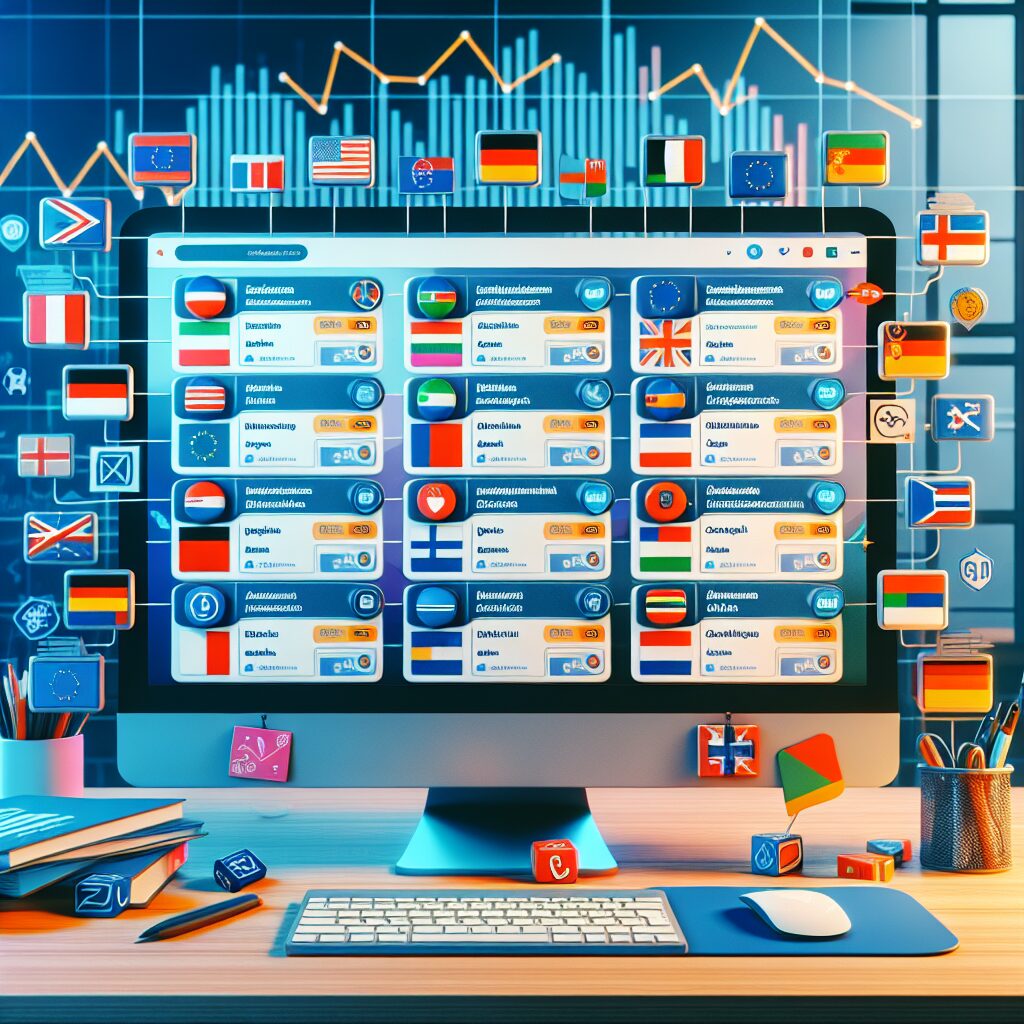About eldris
At Eldris, we automate SEO, multilingual site expansion, and EU compliance for brands scaling across Europe. Our AI-powered platform handles everything from content publishing to regulatory docs—so you don’t have to.
In This Article
- AI Business Tools are critical to sustainable and scalable growth in 2025.
- Tools support marketing, automation, localisation, and personalisation strategies.
- Small businesses can gain foothold advantages using lightweight AI platforms.
- Scalability, integration, and compliance features are essential when evaluating tools.
- Measuring ROI through AI analytics provides momentum and justification for adoption.
Why AI Business Tools Matter in 2025
Understanding the Impact of AI on Global Business
The landscape of modern commerce is rapidly evolving, driven by the acceleration in advanced digital technologies. Among these, AI Business Tools stand out as powerful enablers of efficiency, scale, and innovation. By 2025, businesses across sectors—from retail and logistics to healthcare and finance—are expected to rely on artificial intelligence not just for automation but for strategic decision-making, customer engagement, and sustainable expansion.
AI Business Tools encompass a range of solutions developing at breakneck speed: machine learning algorithms, predictive analytics, natural language processing (NLP), image recognition, robotic process automation (RPA), and more. These technologies aren’t just theoretical anymore; they’re built into platforms that help businesses operate smarter across diverse verticals. They aid in reducing operational costs, refining customer outreach, and making sense of vast amounts of data instantaneously.
As data volumes skyrocket and customer journeys become increasingly complex, mastering the application of AI tools is critical. Businesses that embrace AI early strategically position themselves ahead of their competition, particularly when aiming to capture new markets or enhance their existing offerings. This heightened dependency on AI has also led to stiffer competition among tech providers, making it essential for organisations to know precisely what to look for when choosing their tools.

Top AI Platforms for Business Expansion
A Breakdown of Key Solutions: Marketing, Automation, Analytics
As businesses aspire to expand their geographic and demographic reach, choosing the right AI Business Tools becomes paramount. The top platforms currently offer a multi-pronged approach, addressing crucial domains like marketing automation, customer analytics, lead qualification, sales optimisation, and more.
Marketing: Platforms like HubSpot AI and Salesforce Einstein offer built-in capabilities for email personalisation, lead scoring, and customer journey analysis. These tools allow businesses to deliver the right message to the right audience at the optimum moment. AI-driven A/B testing further aids in refining marketing messages with surgical precision.
Automation: Tools such as UiPath and Microsoft Power Automate enable businesses to automate repetitive tasks, reducing human error and saving time. When integrated with workforce management systems, these tools enhance HR operations, accounting tasks, and supply chain planning.
Analytics: Data visualisation and predictive analytics offered by solutions such as Tableau (now AI-native), Google Cloud AI, and IBM Watson strengthen strategic planning. From forecasting sales to understanding product-market fit, these platforms convert unstructured data into actionable insights.
Importantly, leading platforms also offer strong API integrations. This creates a flexible environment where businesses can innovate at scale without overhauling legacy systems. Whether you are a scaling startup or an enterprise entering a new continent, these tools remove localisation friction and allow accelerated adaptability.
“AI does not replace human intelligence—it amplifies those who use it wisely.” – Industry Thought Leader
AI for Small Business: Breaking Entry Barriers
For years, AI integration was perceived as the dominion of large enterprises with significant R&D budgets. However, modern AI Business Tools have democratised access, allowing even small and medium-sized enterprises (SMEs) to leverage intelligent solutions. Tools like Zoho AI, Pipedrive, and Wix ADI now cater specifically to micro businesses, offering intuitive interfaces and affordable pricing plans.
These platforms often include drag-and-drop functionalities, prebuilt automation templates, and granular analytics that make complex data usable for non-technical users. For small businesses looking to establish a strong digital footprint and increase reach, these tools handle everything from smart scheduling to multi-language support with minimal overhead.
What’s most empowering is the ability to model potential ROI before even deploying the tools, drastically reducing financial risk. Forward-looking SMEs are now able to use AI for tasks such as content generation, customer service via chatbots, and dynamic ad placement, giving them a much-needed competitive edge.
Global Market Scaling Through AI Localisation
As brands venture into new international markets, localisation becomes a pivotal success factor. AI Business Tools now assist with hyper-local translation, cultural nuance detection, and regional audience profiling. Tools like Lokalise and DeepL use AI to not just translate, but to contextualise language based on cultural expectations and idioms.
Meanwhile, AI content engines such as Jasper and Grammarly Business offer regional tone adaptation. This ensures content resonates better in different countries, increasing brand trust and user conversion. In multilingual campaigns, AI simplifies regulatory compliance by aligning with local advertising standards and data policies via real-time assessments.
Furthermore, geo-personalisation features built into advanced platforms allow businesses to launch region-specific promotions, pricing models, and product recommendations. This level of specificity was time- and resource-prohibitive before AI matured, making global expansion more accessible than ever. Learn more about AI Strategies for Scalable Business Growth
Automation & Personalisation in AI-Powered Campaigns
Customers today expect uniquely tailored interactions. AI Business Tools enable highly personalised campaigns by cloning behaviour models, tracking engagement patterns, and using real-time data to present individualised offers. This automation frees up marketing teams to focus on creativity and strategy instead of mundane execution.
Take email marketing: instead of sending bulk communications based on generic customer segments, platforms like Mailchimp AI and Braze curate real-time lists based on behavioural triggers. Coupled with real-time A/B personalisation and automated heatmap analysis, these tools adjust subject lines, colour palettes, and even send times to optimise customer reactions.
The net effect is a reduction in churn, coupled with an increase in customer lifetime value (CLTV). Over time, optimisation becomes fully self-sustaining, creating marketing machines that work 24/7 at global scale. Explore real-world business transformation case studies with AI
Evaluating Scalability and Integration Readiness
While AI promises growth, scalability depends on how well tools integrate with existing business systems and support enterprise ambitions. Before investing, businesses must examine several readiness factors:
- Does the tool offer open APIs for custom integrations?
- Can it handle multi-location operations or cross-border scalability?
- What is the data storage infrastructure—is it cloud-first or hybrid?
Readiness also involves internal cultural alignment. Teams must be educated on AI usage, with clear protocols on system overrides, ethical interpretation, and alert handling. Leading platforms like Eldris invest heavily in intuitive user experience and seamless integration protocols.
By focusing on both external capability and internal adaptability, organisations have a smoother transformation journey. Read a related article
Compliance, Ethics, and Risk Management in AI Tools
No discussion on AI Business Tools would be complete without addressing compliance and ethics. As AI increasingly governs decisions affecting customers, stakeholders, and employees, the regulatory spotlight intensifies. Companies must ensure their tools are not just efficient but aligned with GDPR, CCPA, and forthcoming legal frameworks around data usage and algorithmic fairness.
The best AI tools today offer built-in audit trails, explainable AI models, and bias detection layers. This allows teams to defend automated decisions and adjust them if unfairness is detected. Moreover, ethical AI design isn’t just about laws—it also builds customer trust. Transparent privacy policies and easy opt-out options signal a company’s commitment to ethical interface design and governance.
Additionally, risk management features including anomaly detection and automated system alerts ensure real-time security assessments, further strengthening the digital barriers against breaches or misuse.
Predicting ROI and Measuring Growth Analytics
Understanding the financial impact of AI Business Tools is paramount when lobbying for investment or reporting to stakeholders. Leading analytics platforms now deliver AI-generated insights not just on past performance, but on predicted future growth.
Key Performance Indicators (KPIs) tracked by AI platforms may include customer acquisition cost (CAC), conversion rate optimisation (CRO), net promoter score (NPS), and marketing return on investment (MROI). Importantly, these tools often present AI forecasts with scenario planning—helping leaders visualise investment payback periods or risks under different market conditions.
Companies that weave such analytical capabilities into boardroom strategy better align resources and gain buy-in for widespread AI adoption.
Case Studies: Real-World Brands Using Eldris
Several global enterprises have successfully incorporated Eldris AI Business Tools to scale operations and improve outcomes. A luxury retail brand expanded into three international markets within months using AI localisation and predictive inventory tools. The platform allowed real-time restock automation and reduced forecasting errors by 27%.
Meanwhile, a tech startup in the SaaS vertical used Eldris to run NLP-based customer chatbots. This reduced support email volumes by over 60% and improved first-response times. Moreover, Eldris’ built-in automation features streamlined the sales pipeline by identifying high-conversion leads autonomously.
These examples highlight the scalability, flexibility, and measurable impact that strategic AI integration can offer across different business scenarios.
AI Tools Checklist for 2025 Implementation
Before launching your AI overhaul, ensure you’re making strategic, future-proof choices. Here’s a checklist for evaluating AI Business Tools in 2025:
- Does the tool align with your industry-specific challenges and vernacular?
- Are integration options available for your existing suite of applications?
- Can the solution scale as your business enters new markets?
- Does it have transparent privacy policies and ethical risk management?
- Are ROI projection dashboards and KPIs embedded within the tool?
- Is support documentation available for non-technical team members?
- Does the platform provide multilingual and localisation flexibility?
Final Thoughts: Setting Your Strategy in Motion
[CONCLUSION_CONTENT]
Great guide on ai-tools-for-expanding-your-business-reach-what-to-consider – Community Feedback
What are the best AI tools for business expansion?
Top AI tools for business expansion include platforms for marketing automation, analytics, localization, and customer engagement, such as Jasper, Power BI, and specialized solutions like Eldris.
How can AI increase my business reach?
AI can automate repetitive tasks, personalize marketing, analyze market data, and identify high-potential growth areas, making it easier to scale globally and enter new markets efficiently.
What should I consider before adopting AI tools for growth?
Consider scalability, integration with existing systems, compliance with regulations, user-friendliness, and clear ROI metrics before implementing AI tools for expansion.
Are AI tools suitable for small businesses?
Yes, with affordable pricing and user-friendly interfaces, many AI tools are specifically tailored to help small businesses compete and grow beyond local markets.








